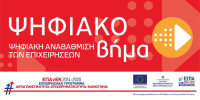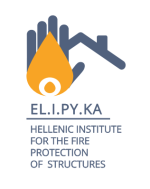Aerosol Fire Suppression System
Every automatic fire suppression system consists of a fire suppression part and a detection part. Pursuant to Fire-fighting provision 15/2014, which entered into force on 01-03-2015, aerosol fire suppression part must be designed in accordance with ISO 15779, ELOT CEN/TR 15276 and the detection part must be designed and certified in accordance with ELOT ΕΝ 54.
Chemical composition
Aerosol is the dispersion of solid particles smaller than 5 μm, which consists of oxides and alkali metal salts, alkaline earth oxides, as well as other non-toxic gaseous products. Fire suppression works by interrupting a fire’s chain reaction that takes place during a fire by binding the free radicals without reducing the oxygen concentration in the area.
Types of fires
DSPA aerosol generators are approved for use in total flooding systems to protect closed unoccupied areas. Aerosol is approved by international standards as a suitable extinguishant for class A (superficial), B and C fires in accordance with EN2/NFPA 2010.
Aerosol has a tested fire suppression capability per class of fire in accordance with the following table:
Classification in accordance with EN2 Classification in accordance with NFPA 2010
A: Solid fuels A: Solid fuels
B: Flammable liquids B: flammable liquids & gases
C: Flammable gases C: Powered devices
Certifications & Tests
DSPA aerosol meets national, European and international standards, including Directive K23001, CEN/TR 15276 - 1/2, NEN – ISO 15779, UL 2775, Directive K23003, NFPA 2010, PrEn15276, Draft ISO 15779, EN54 NEN 2535. In addition, UNIMARSAFE TRADING LTD is certified by TUV Hellas in accordance with ISO 9001:2008, while the DSPA aerosol generators are accepted and approved by the Hellenic Fire Service. In particular, the manufacturer of the generators is certified in accordance with ISO 9001:2008 for the design, development, production and trade of aerosol generators and aerosol fire suppression systems.
The DSPA generators are certified by the KIWA, the Dutch certification agency, in accordance with the requirements of European Standard EN 15276 which governs the design, installation and maintenance of the aerosol fire suppression systems and determines the generator requirements and testing methods.
Additionally, DSPA aerosol has been listed with the U.S. Environmental Protection Agency (EPA) with the name “Powdered Aerosol G” as being suitable for use in the flooding of unoccupied areas.
Back-up operation mode
Should the fire detection system fail, the DSPA aerosol generators have a back-up operation mode, with a thermochemical self-actuation of the extinguishant at 270 0C.
Shelf life - Guarantees
• The extinguishant of the DSPA generator has a shelf life of 15 years. The extinguishant has a 5-year warranty
• The actuator of the DSPA 8-1, 8-2, 11-5 & 11-6 generators has a shelf life of 5 years.
• The actuator of the DSPA 11-1, 11-2, 11-3 & 11-4 generators has a shelf life of 15 years.
• All fire detection materials have a one-year warranty.
The above warranties are provided on the condition that the manufacturer’s maintenance procedure is observed.
Installation
The DSPA fixed aerosol extinguishing system must be installed by competent and qualified individuals.
Commissioning
The system should be put into operation after the installation works have been completed. The qualified personnel should check if the system operates in accordance with the installation design. Tests and inspections should be recorded and the relevant file must be kept.
System hand over
Following the completion of the tests, the system is handed over to the final user. To this end, the user should be duly informed about the DSPA fixed extinguishing systems. For the operational system to be handed over, the relevant system delivery and acceptance form needs to be kept.
Maintenance
Every DSPA fixed aerosol extinguishing system should be maintained during its lifetime, in accordance with the requirements of the law and the manufacturer. It is recommended that a maintenance contract is drawn up between the installer and the user.
Cleaning
After the actuation of the generator and dispersion of the aerosol, the protected area should be cleaned as soon as possible, at least within 12 hours, by qualified personnel, as specifically described in the DSPA manual.







